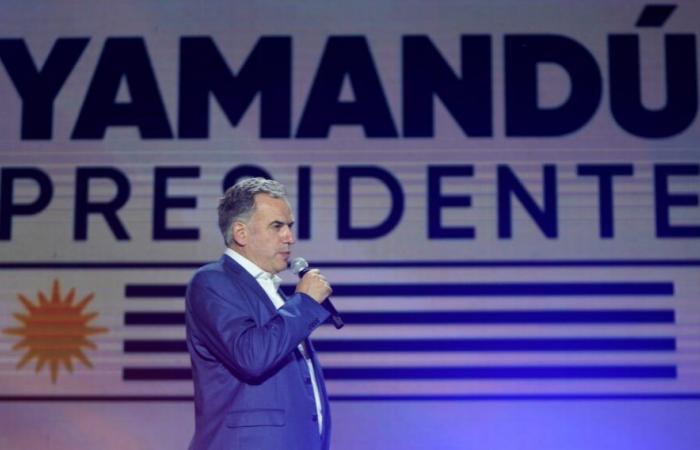JTA – Like many of his Latin American counterparts, the new Uruguayan president is left-wing. But Yamandù Orsi, who narrowly won the second round of the election on Sunday, stands out at least on one point: he has never attacked Israel.
Gustavo Petro in Colombia, Gabriel Boric in Chile, and Luiz Inácio Lula da Silva in Brazil are all staunch critics of Israel; some even severed diplomatic relations with Israel due to the war waged against the Palestinian terrorist group Hamas in Gaza following the pogrom of October 7, 2023. Former Uruguayan President José “Pepe” Mujica, Orsi’s mentor, is also a virulent critic of Israel.
In contrast, Orsi had expressed admiration for Israel’s multicultural society during a visit last year, and reiterated those sentiments this month, shortly before the election, even suggesting that he might identify as a Zionist. He claims to support Israel’s right to exist while supporting the creation of a Palestinian state.
Receive our daily edition for free by email so you don’t miss the best news. Free registration!
“On the boulevard, we see people of both religions,” Orsi told a representative of the Jewish community in Tel Aviv in September 2023. “That’s what surprises me the most, to be honest. There is a part of reality here that is more focused on coexistence than the other. So it’s possible. »
Orsi was then participating in a trip organized by the Jewish Central Committee of Uruguay and the Latin American Jewish Congress, along with representatives of these Jewish groups, as part of an itinerary focused on science and innovation. Orsi, then mayor of Uruguay’s Canalones region, also visited must-see sites, including Yad Vashem, the Israeli Holocaust memorial.
“I am a history teacher and I have given courses on the Second World War and the impact of the Holocaust,” Orsi said in a second interview upon his return. “The guide showed us and explained aspects that I didn’t know at all and which, naturally, shocked me. »
Illustrative: President Luiz Inacio Lula da Silva (right) poses for a photo with Colombian President Gustavo Petro at the Planalto Palace in Brasilia, Brazil, January 1, 2023. (Eraldo Peres/AP)
Orsi was criticized by anti-Israel leftists in his coalition, the Broad Front, for traveling to Israel weeks before the pogrom carried out by Hamas on October 7, 2023, which sparked the ongoing war in Gaza. During this barbaric and sadistic assault, some 6,000 Gazans including 3,800 terrorists led by Hamas stormed southern Israel, killed more than 1,200 people, mainly civilians, kidnapped 251 hostages of all ages, and committed numerous atrocities and using sexual violence as a weapon on a large scale.
He was also criticized by pro-Israel Uruguayans for a post on the social network X during his stay, in which he highlighted the income gap between Israelis and Palestinians in Gaza.
“My strategy is dialogue. I can understand that they want to veto or that they expect some kind of ideological purity from my actions,” Orsi told the interviewer about left-wing criticism. “It’s clear that this is not my path. Dialogue and peace, peace and dialogue, I will not give up, any more than the freedom to express one’s opinion. »
Orsi’s campaign focused on the environment and the economy, and the issue of Israel did not feature prominently in the election discourse. However, just before the second round of the election, he spoke at length about Israel on the airwaves of a prominent Uruguayan radio personality.
The interviewer, Orlando Petinatti, is Jewish and pro-Israel; his show, “Bad Thoughts,” broadcast since 1991, is the most popular Uruguayan radio program. Orsi said he agreed with Petinatti’s assertion that there is “no apartheid” in Israel, recalling that he had observed Arab players on the Israeli team that Uruguay had beaten in a match during her trip.
Orsi also stated that he would qualify as a Zionist according to Petinatti’s definition: “In favor of the creation of a state for the Jewish people in the Land of Israel.” » However, he added that this definition should be accompanied by provisions granting equal rights to religious minorities.
“I love Zionism and I also love that the Palestinian cause results in the creation of a state,” he added. “That said, I support Israel’s right to exist, but I do not always agree with the actions of the Israeli government. »
According to the Latin American Jewish Congress, Uruguay has approximately 15,000 Jews, out of a total population of 3.4 million. While most live in the capital, Montevideo, the coastal city of Punta del Este is also home to a thriving Jewish community. Uruguay was the first country in South America to officially recognize the State of Israel and hosted the first Israeli embassy in Latin America, established in 1948, the year the State of Israel was established.
Javier Mileï, then presidential candidate, holding an Israeli flag during his campaign rally, in Lomas de Zamora, Argentina, October 16, 2023. (Credit: Natacha Pisarenko/AP)
Orsi’s term begins in March and lasts five years. He replaces a center-right politician, who constituted the only break in the leadership of the Broad Front since 2005.
Considered Latin America’s most stable democracy, Uruguay saw 90% of eligible voters cast ballots in each round of this year’s elections. Its neighbor to the west, Argentina, is the largest country in the region with a right-wing president: Javier Mileï is staunchly pro-Israel and is reorganizing his country’s foreign policy after a period of left-wing leadership, in the aim of bringing Argentina closer to the United States and Israel.
Paraguay, in northern Argentina, also has a right-wing, pro-Israel president. Elected last year, Santiago Peña is moving his country’s embassy back to Jerusalem, after his predecessor, a liberal, moved it to Tel Aviv, sparking a diplomatic crisis. Pena plans to travel to Israel next week to inaugurate the Jerusalem embassy.







